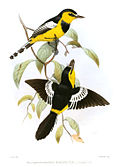| Ward's flycatcher | |
|---|---|
 | |
| Scientific classification | |
| Kingdom: | Animalia |
| Phylum: | Chordata |
| Class: | Aves |
| Order: | Passeriformes |
| Family: | Vangidae |
| Genus: | Pseudobias Sharpe, 1870 |
| Species: | P. wardi |
| Binomial name | |
| Pseudobias wardi Sharpe, 1870 | |
Ward's flycatcher (Pseudobias wardi), also known as Ward's flycatcher-vanga, is a species of bird in the family Vangidae. It is monotypic within the genus Pseudobias. [2] It is endemic to Madagascar. Its natural habitat is subtropical or tropical moist lowland forests. [1]
Its common name and Latin binomial commemorate the English naturalist Christopher Ward, who collected the type specimen of the bird. [3]








